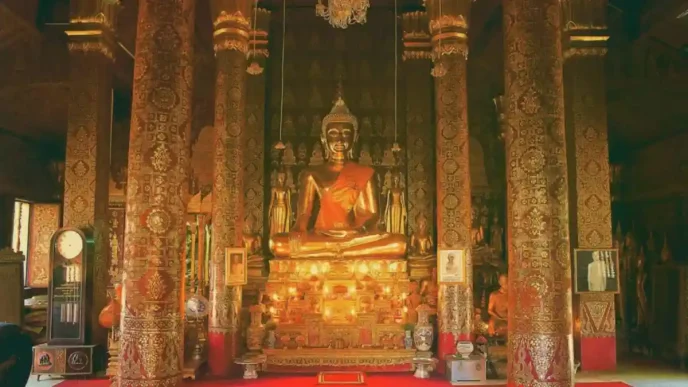In the heart of South Jakarta, The Brickhall at Fatmawati City Center recently transformed into a kaleidoscope of color and sound, hosting the Merch-Making Market (MMM), a unique three-day expo dedicated to music merchandise. Far from a traditional music festival, MMM offered a space for artists and fans alike to celebrate and procure official merchandise, from neon-lit posters of local stars like Iqbaal Ramadhan to customizable T-shirts featuring indie bands such as Sukatani. Held in late March 2025, the event underscored the enduring appeal of music merch as a symbol of identity and community in Indonesia’s vibrant cultural scene.
A Marketplace of Music and Meaning
Walking through The Brickhall, the energy was palpable. At one booth, teenagers clustered around glowing displays of Iqbaal Ramadhan’s posters and pins, while nearby, young adults admired T-shirts emblazoned with the bold slogan “Skill Is Dead” from the rock band Teenage Death Star. Close to the food tents, a live screen-printing showcase drew crowds eager to personalize merchandise featuring lesser-known but beloved bands like Bedchamber. The event’s diversity was striking, with around 200 musicians and bands represented, alongside books on music culture such as “Merchandise Musik: Gaya Visual Dalam Skena” by Arsita Pinandita.
What set MMM apart was its focus on connection rather than performance. This was a space where fans could directly engage with the tangible expressions of their favorite artists’ work. As the crowd swelled during the breaking of the fast—a nod to the timing during Ramadan—an organizer announced a talk show titled “Halal, Haram & Bagaimana Hukumnya Bootleg,” exploring the ethics and legality of bootleg merchandise. It was a reminder that behind the vibrancy lies a complex industry grappling with issues of authenticity and fairness.
Merch as Identity: Voices from the Booths
For many at MMM, merchandise is more than a souvenir; it’s a statement. Yasmin, co-manning the booth for singer Pamungkas, spoke passionately about its significance. “Merch is how we show our appreciation for the artist’s extraordinary body of work. Music is something we can enjoy from anywhere, but clothing can be the disposition of our identity” she told The Jakarta Post on March 22. Pamungkas’ offerings, which include soccer jerseys, necklaces, and vinyl records, are crafted with meticulous care, often in collaboration with indie fashion brand Gimme. “Pamungkas makes good music, which means his merch has to be good as well” Yasmin added with enthusiasm.
Similarly, Arga, a devoted fan of pop star Tiara Andini who helped oversee her booth, emphasized the deep bond between artists and their supporters. The surprise appearance of Tiara herself, introducing her merchandise to attendees and online followers, sent waves of excitement through the crowd. “As devoted fans, there has to be a solid interconnectedness between us and the artist” Arga asserted. “We would wear her official merch as we watch her at concerts, as our form of support.”
The Shadow of Piracy
Despite the celebratory atmosphere, challenges loom over the music merchandise landscape. Miska, speaking on behalf of MMM’s organizing team, highlighted piracy as a persistent issue. He distinguished between bootlegging—often small-scale and creative—and piracy, which involves unauthorized mass replication. “Pirated items are sold for lower prices, though the quality is poorer” he explained. “The perpetrator would then profit off of the items. That’s a huge issue, actually.”
Miska’s own research into his band Swellow’s T-shirts on online marketplaces revealed how difficult it can be for consumers to identify counterfeit products. This not only undermines artists’ revenue but also dilutes the value of authentic merchandise. Yet, he remains optimistic about changing public perceptions. “Even for those who don’t like music at all, it’s okay to buy the merch anyway. Clothing is a primary need, right? You could wear it at work. It’s okay, as long as it’s comfortable” he quipped.
A Cultural and Economic Force
Music merchandise in Indonesia is more than a niche market; it’s a cultural and economic force. For artists, especially during periods like Ramadan when live performances may be limited for bands without religious-themed albums, merch offers a vital revenue stream. Miska noted that public awareness of the quality of official merchandise is growing, encouraging artists to continue producing despite the threat of piracy. Events like MMM play a crucial role in this shift, fostering a space where fans can access high-quality, authentic products directly from artists or their teams.
Beyond economics, MMM reflected the intersection of music, fashion, and identity in Indonesian society. From teenagers sporting band tees as a badge of belonging to adults exploring vinyl records as collectibles, the expo captured a cross-generational appreciation for music culture. It also showcased the creativity of local artists and brands, many of whom collaborate to produce items that resonate with fans on a personal level.
Looking Ahead
As the Merch-Making Market wrapped up, its success left a lasting impression on South Jakarta’s cultural calendar. The event proved that merch is far from a fleeting trend—it’s a vibrant expression of fandom and artistry that continues to evolve. Yet, with piracy remaining a stubborn challenge, questions linger about how artists and organizers can protect their work while keeping merchandise accessible to fans of all backgrounds. For now, The Brickhall’s colorful booths stand as a testament to a community united by music, identity, and the simple joy of a well-made T-shirt.














